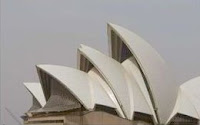A dust storm from the outback blankets Sydney; Australian drought continues: photos by Tim Wimborne / Reuters 23 Sep 09. See also Brigid Walsh's Dustwatch Report and Australian Water Network.

 Worst-case climate scenarios are already happening, according to the UNEP United Nations Environmental Program. New scientific data*, released as the G20 meet in Pittsburgh, show tipping points -- both in speed and size -- are coming much faster than previously predicted by the IPCC and may soon be irreversible. UNEP says, "It may still be [scientifically] possible to avoid the most catastrophic impacts of climate change. However, this will only happen if there is immediate, cohesive and decisive action to both cut emissions and assist vulnerable countries adapt."
Worst-case climate scenarios are already happening, according to the UNEP United Nations Environmental Program. New scientific data*, released as the G20 meet in Pittsburgh, show tipping points -- both in speed and size -- are coming much faster than previously predicted by the IPCC and may soon be irreversible. UNEP says, "It may still be [scientifically] possible to avoid the most catastrophic impacts of climate change. However, this will only happen if there is immediate, cohesive and decisive action to both cut emissions and assist vulnerable countries adapt."

 Worst-case climate scenarios are already happening, according to the UNEP United Nations Environmental Program. New scientific data*, released as the G20 meet in Pittsburgh, show tipping points -- both in speed and size -- are coming much faster than previously predicted by the IPCC and may soon be irreversible. UNEP says, "It may still be [scientifically] possible to avoid the most catastrophic impacts of climate change. However, this will only happen if there is immediate, cohesive and decisive action to both cut emissions and assist vulnerable countries adapt."
Worst-case climate scenarios are already happening, according to the UNEP United Nations Environmental Program. New scientific data*, released as the G20 meet in Pittsburgh, show tipping points -- both in speed and size -- are coming much faster than previously predicted by the IPCC and may soon be irreversible. UNEP says, "It may still be [scientifically] possible to avoid the most catastrophic impacts of climate change. However, this will only happen if there is immediate, cohesive and decisive action to both cut emissions and assist vulnerable countries adapt."Among the danger signs: GHG emissions are rising faster than ever. Warming will increase above 2-3°C, the tipping point for the complete melting of polar ice and Himalyan glaciers. Sea level will rise 2 meters or more by 2100. Ocean acidification is occurring, killing coral reef life as well as removing a major CO2 sink -- and on the California coast it is decades earlier than predicted.
If the trends continue, major climate systems will change: the monsoons of India, West Africa, and the rain system of the Amazon; with severe and irreversible drought in the US Southwest, Australia, the Mediterranean, Mid-East and Central Asia; elsewhere, irrigation and hydro power would fall sharply. Remaining "biodiversity hotspots" (reservoirs of species replenishment) would disappear. Failure of deep-ocean currents, or massive CO2 + methane release from melting permafrost, could then drive the process into the catastrophic 4-6°C range.
* Data are in UNEP's new Climate Science Compendium. See also UNEP Green New Deal update for the G20 summit Sep 2009, with details of current "green stimulus" plans of major countries; download its other publications. Nature Sep 09 has an article signed by 28 scientists warning that we are exceeding earth's capacity. Dust storms are spreading disease, says the UK Observer 27 Sep 09.
Philippine Quakers have just emailed for help after flash floods in Manila and 25 provinces in which at least 246 Filipinos died. Suburbs and villages are without food, water or power. Typhoon Ketsana is now about to hit Thailand. Activists at the UNFCCC meeting in Bangkok blame climate change.
Philippine Quakers have just emailed for help after flash floods in Manila and 25 provinces in which at least 246 Filipinos died. Suburbs and villages are without food, water or power. Typhoon Ketsana is now about to hit Thailand. Activists at the UNFCCC meeting in Bangkok blame climate change.

1 comment:
You can see more about the dust from the DustWatch report at my blog http://misseaglesnetwork.blogspot.com/2009/09/dust-watch-interim-report-22-23.html
It is open to conjecture whether this is climate change or just Australia's usual coondition as the driest inhabited continent on earth and the long, long drought we are in.
Either way it would seem that we have lessons to be learned from these events - and we in Australia seem to be slow in learning them.
As our continent gets drier and drier we have corporatised and commodified our water and are unwilling to reverse the situation. To do this we have gone against the natural order and unbundled land and water so that water can be traded.
The Australian Water Network (Patron is Maude Barlow, Canadian water activist) has been established this year. Go to http://groups.google.com/group/australian-water-network?pli=1
Blessings and bliss,
Brigid
Post a Comment